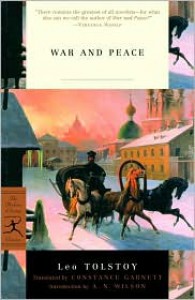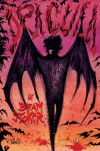Currently reading
The Last Picture Show (Mass Market)
Dracula
Ludwig Wittgenstein: The Duty of Genius
The Portrait of a Lady
Maigret et le marchand de vin
Le Rouge et le Noir
 This book is a monster. So much so that I felt myself struggling with it physically more than I have any book since my seventh grade math book. I’ve never been one to worry about creasing a binding, but I found myself delighting in bending it backward, scratching and tearing at the covers, smudging the type with my sweaty hands, even pretending the book was a stocky beligerant bully and assaulting someone with it.
This book is a monster. So much so that I felt myself struggling with it physically more than I have any book since my seventh grade math book. I’ve never been one to worry about creasing a binding, but I found myself delighting in bending it backward, scratching and tearing at the covers, smudging the type with my sweaty hands, even pretending the book was a stocky beligerant bully and assaulting someone with it.But as far as enjoyment of it goes, I was dissappointed. There is much that is interesting, beautiful, and exciting about this book. There were also a number of times when I had the experience that he was telling me about something that I knew but hadn't been able to put to words. One of my favorite passages is:
"Life is everything. Life is God. All is changing and moving, and that motion is God. And while there is life, there is the joy of the consciousness of the Godhead. To love life is to love God. The hardest and the most blessed thing is to love life in one's sufferings, in undeserved suffering." (1212)
I think Tolstoy deserves to be recognized for quality of the writing in this regard. He is able to cram a lot of stuff into this book that is worth reading. A lot of that stuff comes in fairly small disconnected pieces though.
It seems to me there are distinct layers to the book. The story of the main characters, the history of the war, historical analysis of the war, and philosophy of history.
Overall the plot consists for the most part of two kinds of action. Action driven by the historical story (major battles, the burning of Moscow), and a remarkable chain of coincedental connections and events. Just when Petya Rostov is killed they rescue Pierre, not to mention that Petya had just coincidentally been sent as a messenger to Denisov, who coincidentally is working with Dolohov. These coincidences were often unbelievable to me.
In the end I felt that the struggles of the characters didn’t have a whole lot to do with the external events that moved them around. This makes them feel a little thin to me. While I enjoyed the stories of the main characters and did feel connected with them, there was always something that felt a little bit sketchy rather than fully developed about them. They each have a sort of defining feature or characteristic that seems to determine the character of their life in a way that makes them feel less than human.
There are also a number of characters who are central for a some portion of the book and then simply dissappear (Anna Mihalovna) or fade out (Boris). Even the main characters are in and out over the course of the story. This had a destabilizing effect for me. While I can identify with all of them, I can't really get behind any of them in a way that makes me feel a part of the book. While I can identify with Pierre to a great deal he is made too much a buffoon. Particularly when it is revealed that all of his well intentioned projects are failures that only make the lives of his peasants worse rather than better. (Of course it is worth mentioning the whole romanticized view of serfdom for "good masters" like Nick Rostov that understand their place as master and that the peasants truly appreciate that is disturbing along another axis.) Andrei is clearly intelligent and practical but too fragile for the difficulties of real life. Natasha is vibrant and youthful but lacks wisdom. Nick Rostov has honor but is too conventional. So while I do care enough about them to like them all, and to want to know what will happen to them, I also always feel distant from them.
Kutuzov is the only "character" that bridges the gap at all between the layer of historical events and the narrative strand. The way he is portrayed is definitely memorable, but he is a major question mark for me. He is idealized as the one individual who grasps the uncertain currents of history flowing around him and able to guide his fellow Russians in a way that takes advantage of this flow rather than fighting against it. If history is so contingent, then why should we believe that Kutuzov of all people has achieved some Taoistic understanding? Why is he an exception to the usual blindness of men to their impotence against history or contingency? If Tolstoy weren't so obsessed with trying to make historical and philosophical points through this character I think I would be able to enjoy his characterization of him as some mysterious Russian general who simply knew what to do. Tolstoy incessantly points to him and seeks to use him as the focal point of his discourses. Thus it doesn't seem unfair to me to ask him to make sense in the discursive context as well as the narrative one, and that just doesn't happen for me. Napolean is merely a destructive gambling fool, but Kutuzov intuits the essence of reality just isn't a terribly compelling portrait. All the arguments should apply equally well to Kutuzov.
I think again, Tolstoy deserves full credit for succeeding in making the events of the war which are basically common knowledge full of drama.
Other than the imbalance just mentioned I found most of the historical analysis (an by this I mean the actual analysis of battles and decisions, not the philosophical material) very interesting and thought provoking. I didn't have a detailed knowledge of the Russian campaign before reading this book but I did have a decent overall picture that was of course shaped in many of the ways that Tolstoy points out. In this regard I don't need him to be absolutely right about his analyses because he is making me rethink my understanding of events. I found it interesting that he was so committed to his analysis but given the nationalist motives that they end up supporting it's not as amazing as it at first appeared.
Lastly, the wonderful topic of the history of philosophy offered in this book. As many other reviewers noted, these speeches are frequent and repetitive. I couldn't really find much coherence here either. He takes similar ideas in very different directions without much coherence among them.
Much of the value of the stories of the characters is in the spiritual journeys they take, many if not all of which seem to be told in a distinctly Christian framework. Furthermore, love is a crucial element in each of these stories as a support and life giving intimacy between individuals. Ok, Tolstoy doesn't need to be committed to this view to tell the story through that perspective, but then the historical determinism that is offered is a very harsh alternative that seems to throw the character development under the bus. If it is truly essential to overcome the perspective of individual freedom, then what is the value of the stories and the revelations that the individuals experience?
On the other hand many passages seem to indicate that he believes no theory of history to be possible due to the contingent nature of all events. This is first expressed through Bolkonsky’s thoughts about military science, but is reiterated through the narrator's voice at the battle of Borodino. No such science is possible, as contingency is what truly rules the day in the end. In this context it is repeatedly offered that the people on top are the least free and the soldiers at the bottom are the most free. History then is made by the little people. This idea seems in many ways similar to the butterfly effect.
Taken in another direction we are offered the indefinite notion of a calculus of history which has to take the infinitesimals into account properly to give a valid theory. Again though, it is unclear why all of the other theorems of military or historical science have been false, and how this calculus is truly to make sense of the variety of individuals and their circumstances. He asks us again to believe that all other sciences of these matters are false and actuallly dumb, and yet without much definition of it we are asked to accept on faith the existence and explanatory power of this calculus. We are also left without much understanding of how this calculus is to help us, when the paragon of virtue seems to be Kutuzov who relies wholly on intuition and feeling, and succeeds for this reason.
The epilogue is the worst part of the book in my opinion. The epilogues first part is an awful portrait of the disgustingly unmitigated joy of all the remaining characters. Everyone is entirely happy in the sequestered life of the manor and all the players are perfectly balanced with eachother. The political conversation that springs up on Pierre's return seems to point to further troubles ahead, implying that there is no end point (another point Tolstoy had made earlier) and that all of what has happened can be seen as providing the ground for the next conflict.
Getting to the end to find out that I must overcome my sense of free will in order to understand history felt like getting punched in the stomach and the only thing that felt appropriate was to go and wash the dishes. The thing that makes the ending so difficult is that for the most part the stories of these people was compelling enough to make me want to continue following them. So when I am told that these stories are mere appearance and that really individuality is just the result of historical laws if only we can see it, I feel betrayed to a certain degree. This seems tantamount to telling me that I wasted my time in caring about the characters in the first place.
Lastly, it seeems to me that there are a lot of very old, very standard questions about determinism that make it a very repugnant view. Even if he is offering a new account of why we must believe in some form of determinism, the inevitable futility of everything under a determinist view seems to be a very tough nut to crack. For one thing what is the point of trying to write this book convincing us of all of these various theses? Why is it “essential” that we recognise a dependence on history, and a lack of freedom of the will? What could that even mean?
In the end although I enjoyed the story I didn't think it a great one and the rest of what was offered me just didn't seem to live up to what was insisted of it. It did matter to me a lot how the book ended.









